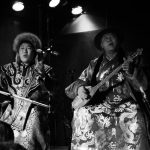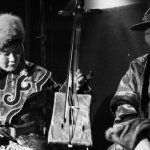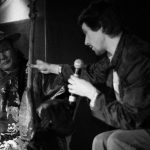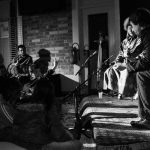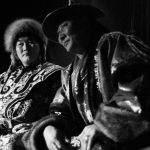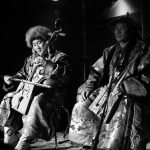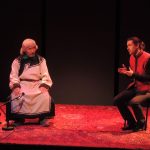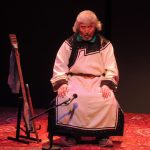In order to promote Mongolian culture and cultural heritage in Europe, through the awareness-raising activities on Mongolian traditional music, khöömii, as well as cuisine, games and traditional script, Routes Nomades offers a series of lessons that can have different forms:
- Courses
- Lecture-concerts
- Lectures
- Workshops
Apart from this offer, on request, we can also recommend you other types of educational activities and other contributors, quality lecturers and experts on Mongolia.
Courses
We, Routes Nomades and the musicians we work with, are particularly fond of transmission. Alongside the concerts, we propose (and sometimes organize) the courses of Mongolian traditional music, especially overtone singing.
Giving the opportunity to the audience and Mongolian music lovers to experience a privileged moment of practice and exchange with the musicians, before or after the concert is essential. Beyond the often-frontal relation of public and stage, and a certain distance between audience and artist, the convivial environment of the course enables the participant to find out more about the musicians and experience their practice from within, with them, through their own notions and perceptions of music.
Depending on your project, we offer several options that can be modified:
Within the framework of a tour with the Mongolian overtone singing masters:
Courses by Tserendavaa Dashdorj, Odsuren Baatar, Sengedorj Nanjid or Tsogtgerel Tserendavaa, accompanied by Johanni Curtet.
- Elementary course: public of all ages (children from 13 years), no musical level required, learning the fundamentals of overtone singing (respiratory management, making the fundamental drone with guttural voice, various exercises based on vowels and phonemes, modulation of the lips and tongue, listening to the voice timbre, superposition of several simultaneous sounds, playing with harmonics), ethnomusicology theory
- Advanced course: for the lovers of overtone singing who can already perform at least one Mongolian traditional melody in one or more overtone singing techniques, revision of fundamental knowledge, development of the acquired skill with collective level (learning a new melody, one or more new techniques, new exercises), ethnomusicology theory
Duration of courses: according to your wish, 2h, 3h, 6h, 12h…
References: Théâtre de la Ville of Paris, Quai Branly Museum, Museum of Asian Arts of Nice, Les Orientales Festival, Les Détours de Babel Festival, Centre for the Heritage of Instrument-Making, City of Arts in Chambéry, La Piscine in Dunkerque…
Off-tour, available all year round:
Courses by Johanni Curtet.
- Individual courses in Rennes and elsewhere (by the cycles of 5 sessions)
- Elementary and advanced courses
- Preparatory sessions prior to the courses with Mongolian masters
References: Philharmonie de Paris, Cité de la musique, University of Rennes 2, Les Suds à Arles Festival, Les Orientales Festival, Centre for the Heritage of Instrument-Making, Péniche Spectacle in Rennes, Karma Ling Institute, Tortue Écarlate association (Cannes, Nice, Levens)…
Note
There are many propositions in the teaching of overtone singing. We would like to emphasize that the courses we organize is in the direct line of the existing khöömii transmissions in Mongolia. Musical and Mongolian above all, this practice differs from the western overtone singing and its many variations, ranging from “shaman singing” to the “yoga of sound”.
After 10 years of ethnomusicological research and extensive discussions with Mongolian musicians and heritage bearers, it is important to highlight the reality of this tradition:
- khöömii is not a “shaman singing”
- khöömii is not used by the Mongols for supposed meditative or therapeutic functions
Lecture-concerts
Within the framework of the Mongolian artists’ tour we organize, besides the concert, we propose a lecture-concert with one or two musicians and an ethnomusicologist as a mediator.
Duration: 30 minutes, 45 minutes or 1 hour
Speakers (according to availability): Tserendavaa Dashdorj, Sengedorj Nanjid, Ganzorig Nergui, Tsogtgerel Tserendavaa + Johanni Curtet
Topics covered:
- Styles, techniques and repertoire of Mongolian overtone singing;
- Vocal and instrumental music of Mongolia;
- Music and nature, from the legends to the musical repertoires;
- Presentation of a Mongolian musician through his/her characteristics of style and composition
Lectures
Within the framework of a tour and available for all year.
Johanni Curtet, an ethnomusicologist and overtone singer gives lectures around the following themes:
- Ethnomusicology and history of Mongolian overtone singing
- The art of timbre, aesthetic variations on the overtone singing in Mongolia
- Khöömii transmission in Mongolia
- Khöömii: from local practice to the subject of heritagization
- Music of Mongolia.
Nomindari Shagdarsuren, a specialist of intangible cultural heritage gives lectures around the following themes:
- Cultural and natural heritage of Mongolia
- General policy of Mongolia on the protection and safeguarding of cultural heritage
- National and international commitments and efforts on the cultural heritage (with the inscriptions of the elements of intangible and tangible cultural heritage as well as natural heritage of Mongolia on the different lists of UNESCO)
- Notion of intangible cultural heritage in Mongolia
- Implementation of different projects on the intangible cultural heritage.
Lectures on Mongolian heritage
Duration: 1h or 1h30
Watch and listen to the lectures on line:
http://atelier-sciences-voix.fr/index.php?page=asv3-3-chant-diphonique
21 January 2015: “The transmission of khöömii, art of vocal timbre”, Season 3 of the Science and Voice Workshop, GIPSA-Lab CNRS, Grenoble
https://www.lairedu.fr/media/video/conference/des-musiciens-ethnomusicologues/
20 November 2014: “The Musician-Ethnomusicologists?”, round-table with Emmanuel Parent, Eric Montbel, Yves Defrance, Luciana Penna-Diaw and Marthe Vassalo, Treuskas, Professional Day of Reflection and Artistic Research in the Field of Performing Arts, Le Pont Supérieur, University of Rennes 2.
http://www.cdmc.asso.fr/fr/actualites/saison-cdmc/musique-est-elle-contre-nature
5 April 2014: “Is Nature Musical?”, round table with Louise Bessette, André Serre-Milan, Gilles Malatray and Jacques Panisset, conference “Is The Music Against Nature?”, Les Détours de Babel Festival, Musée Dauphinois, Grenoble.
Workshops
Nomindari Shagdarsuren, project officer of Routes Nomades association offers introductory workshops on Mongolian culture, through cuisine, traditional games and traditional script.
Mongol bichig
INTRODUCTORY WORKSHOP ON THE MONGOLIAN TRADITIONAL SCRIPT
This workshop enables the participants to discover Mongolia through its over-million-year-old traditional vertical script, Mongol bichig. Also known as Khudum bichig and Uigurjin bichig, the Mongolian traditional script was prohibited from practice and transmission for over a half century under the Soviet period (1921-1990) in Mongolia. Today, although there has been a renewed interest in revitalizing Mongol bichig to make it one of the official scripts, the mobilization remains still slow. Hosted by a Mongol bichig practitioner with over twenty years of practice, this workshop offers the participants to discover the history and characteristics of this singular script, and try the first lines to delineate the alphabet and write their first names.
Download the detailed introduction of the workshop
Buuz – Dumpling
WORKSHOP ON MONGOLIAN CUISINE
A glimpse of the Mongolian cuisine culture: preparation and tasting a traditional dish buuz.
A dish symbolizing respect for guests, and also the main course of traditional festival Tsagaan Sar, the Lunar New Year, buuz is one of the most representative meals of the Mongols. Found throughout Asia among both the nomads and settlers with different names and styles, the dumpling buuz is a real intercultural dish.
A great opportunity to enrich the culinary expertise of the French, who celebrated their intangible heritage, by inscribing the Gastronomic Meal of the French in UNESCO! This workshop allows participants to work in pairs and share a warm and relaxed atmosphere with fun.
Download the detailed introduction of the workshop
Shagai – Ankle bone game
WORKSHOP ON THE MONGOLIAN TRADITIONAL GAMES
Horse Race, Ankle Bone Hiding, The Four Challenges, Ankle Bone Flicking, Picking Seven Ankle Bones, Multicolored turtle… Mongolian traditional games of ankle bones are numerous. Easy to make and keep in nomadic lifestyle, the ankle bones are not only objects of entertainment and education, but also symbol of friendship, courage and prosperity.
So come play shagai with your family and friends! Suitable for both children and adults, easy to learn and handle, the ankle bones are played by at least two people. This entertaining and participatory workshop offers a cultural window on Mongolia through an introduction to different Mongolian games of ankle bones.
Download the detailed introduction of the workshop
Biography
Nomindari Shagdarsuren, MA
Holder of Master’s degree in Mediation of cultural heritage at the University of Rennes 2, Nomindari Shagdarsuren is specialized in the sector of the intangible cultural heritage (ICH). She has worked for national and international cultural engineering organizations in Mongolia (Mongolian National Commission for UNESCO, Foundation for the Protection of Natural and Cultural Heritage), France (French Centre of Intangible Cultural Heritage) and South Korea (ICHCAP-International Information and Networking Centre for Intangible Cultural Heritage in the Asia-Pacific region under the auspices of UNESCO).
Project officer at the Routes Nomades Association, she also participated in the elaboration of the nomination dossiers of ICH elements of Mongolia to the UNESCO lists, such as Mongolian traditional art of Khöömei, Naadam, Mongolian traditional festival, Mongol biyelgee, Mongolian traditional folk dance and Mongol Tuuli, Mongolian Epic. She published several articles on the ICH in Mongolian, English and French.


